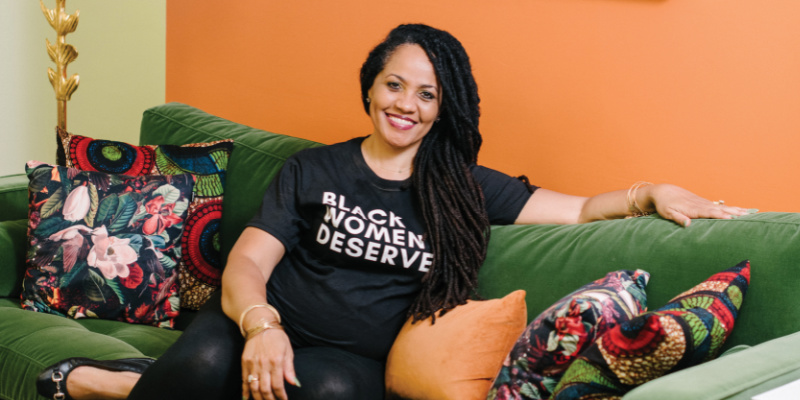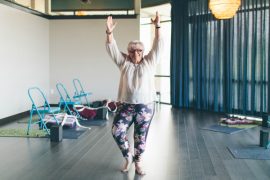By Emily McCluhan
Twenty years ago, as a young Black mother of five children, Lisa Peyton-Caire was used to being asked if she had her WIC card at the grocery store checkout. While at a prenatal appointment, pregnant with her fourth child, the nurse requested that she confirm the names of her children and their father’s names. The nurse repeatedly inquired if it was correct that all of her children had the same father, pressing Peyton-Caire to confirm that she was certain. The stereotype of an irresponsible, uneducated Black woman clung to her in the predominantly white city of Madison.
As the founding CEO and president of the Foundation for Black Women’s Wellness (FFBWW), Peyton-Caire hears similar stories from the community of Black women she supports.
“It starts with how health care providers are prepared, and how we speak about and frame the issue of race, equity and quality care. And how we integrate the truth that we all want to deny — that we’ve all grown up in a racialized society,” says Peyton-Caire.
Dr. Tiffany Green, assistant professor in the Departments of Population Health Sciences and Obstetrics and Gynecology at University of Wisconsin–Madison School of Medicine and Public Health, says these prejudices are just one structural barrier that creates disparities in the care provided to communities of color and other marginalized populations.
One example, Green says, are medical algorithms that track how women have previously given birth. If a Black and/or Hispanic woman had a C-section for their first birth, then the algorithm might automatically suggest that a vaginal delivery will be unsuccessful and will recommend C-sections in the future. “There’s no biological or genetic reason why that should be the case.”
Green points out that although race (Black) and ethnicity (Hispanic) are sociocultural rather than biological or genetic constructs, they are included in the calculator used to assess a patient’s probability of successful vaginal birth after cesarean (VBAC). Because there is greater risk for complications and death for both mother and baby with C-sections versus vaginal births, women of color are unnecessarily put in harm’s way, she adds.
“Pain management is [also] a critical disparity and is tied to Black women not being heard,” Green says. “In a recent study that’s under review using [UnityPoint]–Meriter Health data, we found that Black women experienced more pain post-C-section, but they didn’t get any more medication than white women. In fact, when we control for pain levels, they got less medication.”
This isn’t a phenomenon limited to just Black women. According to numerous studies cited in a Proceedings of the National Academy of Sciences of the United States of America article, “Black Americans are systematically undertreated for pain relative to white Americans … These findings suggest that individuals with at least some medical training hold and may use false beliefs about biological differences between Blacks and whites to inform medical judgments, which may contribute to racial disparities in pain assessment and treatment.”
IT TAKES A VILLAGE
But healthcare inequities are just a small piece of why there are racial disparities in health. It’s also due to where people live, work and spend downtime, says Green.
Also called social determinants of health, Green explains that these are not based on biological or genetic factors. These are structural barriers often created by systemic racism. Black and/or Latinx and Native American communities have higher unemployment rates than whites. Consequently, this limits access to health insurance and health care. These same groups have higher poverty rates, which creates food insecurity and prolonged stress. This can lead to mental health issues, as well as higher rates of diabetes and cardiovascular disease.
Groups like the Foundation for Black Women’s Wellness exist to help women of color navigate these barriers and disparities.
“We start with empowering Black women with information as health care consumers through education and awareness,” Peyton-Caire says. “We help Black women embrace their power to shape and lead healthy, stable lives … and to know what questions to ask, how to advocate for themselves, how to push back and demand better care if they are in a situation where they feel like they’re not being heard. You have the right to speak up.”
The pandemic shuttered the newly-opened Black Women’s Wellness Center in March 2020, so Peyton-Caire and her staff pivoted to host the 12th annual Black Women’s Wellness Day virtually, and tripled the number of women engaged with their services. The center has already reopened in a limited capacity, and they’ll continue with a hybrid of in-person and virtual services.
The need for this type of community and advocacy is also what drives Tia Murray, founder and CEO of Harambee Village Doulas, a community-based doula agency working to enhance the childbearing experience by providing access to doulas, and is centered on dismantling inequities in maternal and child health outcomes for marginalized communities.
“We’ve all heard that doulas produce better outcomes, but why is it that? I think it’s because doulas are filling in those gaps so that moms or birthing people feel like they have access to more information, that they’re listened to, and that their questions are answered,” says Murray.
As a Black mother of five, Murray understands the risks she and her babies faced compared to white birthing women. In 2018, when the CDC announced that Wisconsin had the highest infant mortality rate of Black babies in the country, Murray already knew the stats: In 2016-18 in Dane County, the Black infant mortality rate was as high as 12 infant deaths per 1,000 live births compared to about four for white infants.
According to the CDC, Black women are about three times more likely to die from a pregnancy-related cause than white women, regardless of socioeconomic background. And preterm births are about 50% higher for Black women than white or Hispanic women.
“But studies have shown that when pregnant people work with doulas, they’re almost four times less likely to have a low birth weight baby or a preterm birth. We also know that doulas produce better breastfeeding outcomes, and breastfeeding is a protective factor against infant mortality,” says Murray.
Last October, Harambee launched a crowdfunding campaign to purchase land for the future Harambee Village Family & Birthing Center. Although its opening is delayed until 2023 due to the COVID-19 pandemic, Murray describes the center as a one-stop shop for family resources, fitness and nutrition, mental health, grief counseling, breastfeeding support and access to doulas and midwives, as well as doula training. They are also working on a community care program that will kick off next year, and a partnership to create Madison’s first midwifery school, because, as Murray says, “Closing birth disparities takes a village.”
MEETING WOMEN WHERE THEY’RE AT
Dr. Patricia Téllez-Girón, physician and associate professor with the UW–Madison Department of Family Medicine and Community Health, also works to foster a strong sense of community when it comes to health care. As co-chair of the Latino Health Council, she and fellow chair, Shiva Bidar-Sielaff, organize a network of resources to support the Latinx community, which is the largest nonwhite ethnic group in Dane County. Téllez-Girón notes that only half of Latinx people have private health insurance and about 17% live at the poverty level.
A key challenge Latinx people also face are mixed families — some family members may be citizens, or, some might have DACA status (Deferred Action for Childhood Arrivals, a policy that protects young people who entered the U.S. unlawfully as children) in households with undocumented parents. Often, this means care is provided for the children, but parents aren’t covered by insurance.
“Women especially face challenges when they come to the U.S., because back home, often they do not work. They are the caretaker,” she says. “Now, they have to work in order to help send money to the family left in their home country, and support the family here. That doubles the stress and makes their own health the lowest priority.”
Seventeen years ago, Téllez-Girón realized the best way to educate her community was through radio, since nearly 25% of the Latinx community are employed in the service industry and listen to it regularly. She created a monthly health education program, “Nuestra Salud” (“Our Health”), which continues to air on the local Spanish-speaking station, La Movida, that focuses on the importance of health education, health care, how to navigate the system and community resources. And that’s just one example of the work the Latino Health Council is doing. Since 1996, the council has hosted the annual Latino Health Fair where Latinx people can learn about community services and get screened for preventable diseases. In more recent years, they’ve added the Teen Health Bash, events centered around nutrition and exercise, and COVID-19 vaccine outreach. Téllez-Girón is also a provider at Access Community Health Wingra Clinic, where she acts not only as a primary care physician, but often also as a social worker, mental health consultant and advocate.
“I know I can’t do this alone,” she says. “If I have a patient come to me with a history of domestic abuse, I can do the initial consult, but then I can refer to UNIDOS [a domestic violence support organization]. Or if I need to establish services for a family, I can call Centro Hispano.”
In recent years, Téllez-Girón has presented at national conferences on the state of Latinx care and says she is often astounded that Dane County far exceeds some of the programming offered in places like Los Angeles and Miami, where there are much larger Latinx populations.
“We still have a lot of health disparities, but in other places, language access is horrible,” she says. “But Shiva established beautiful interpreting services through UW–Madison over 20 years ago … now all hospitals in Dane County offer interpreter services.”
Téllez-Girón also mentors Latinx pre-med students to help them gain acceptance into medical schools and build a diverse pipe- line of providers. She involves students in the Latino Health Council’s events to help them become community advocates and create programs to remove social disparities that lead to poor health outcomes.
From Green’s perspective, diversity and addressing implicit bias in the medical community is a start, but without accountability for providing equitable care or focusing on structural change, health inequities will remain. This comes when those algorithms for trial of labor after a first C-section no longer take race into account, and when the standardized care of pain management is in place, so that “institutionally sanctioned racial stereo- typing” doesn’t come into play, she says.
Peyton-Caire and FFBWW are working to impact structural change by shaping the narrative about Black women’s health to build on the momentum of the social justice movement started in 2020.
“We are developing a policy blueprint called Black Women Deserve,” she says of an eight-pillar plan that outlines policy priorities that advance the wellbeing of Black women and families in Wisconsin. The plan includes supporting economic security, equal protection under the law and quality education, with the hope that it urges policymakers and other decision-makers.
“If we want more abundance for all, we have to have a Wisconsin where everyone has their needs met. Where they don’t have to worry about being evicted, or affording medical care or their next meal,” says Green. “All of those basic needs have to be met for people to grow and flourish and thrive.”
COMMUNITY-BASED HEALTH AGENCIES
These area organizations provide access to health care and support overall wellness.
Access Community Health
A center that provides medical, dental and behavioral health care; a pharmacy; and financial counseling services that prioritize quality and affordability, all under one roof. 2202 S Park St., accesscommunityhealthcenters.org
Collaborative Center for Health Equity
CCHE connects rural, urban and tribal communities with University of Wisconsin– Madison resources to form engaged partnerships that advance health care equity across Wisconsin through leadership development, research and technical assistance. 4240 Health Sciences Learning Center at 750 Highland Ave., ictr.wisc.edu/cche
Foundation for Black Women’s Wellness
A nonprofit organization that supports individual Black women’s health and wellness journeys and works to address health care disparities for women of color, their families and their communities. 6601 Grand Teton Plaza Ste. A2, ffbww.org
Harambee Village Doulas
A community-based doula agency working to enhance the childbearing experience by providing access to doulas centered
on dismantling inequities in maternal and child health outcomes for marginalized communities. 2423 American Ln., Ste. 5, harambeevillage.org
Latino Health Council
A Dane County virtual network of over 40 health care organizations that promote education and access to quality health care that is culturally and linguistically inclusive. latinohealthcouncil.org
UNIDOS
UNIDOS aims to “break the cycle of domestic violence” by providing support groups, victim advocacy and statewide community-based education for Latinx survivors of domestic violence, assault and human trafficking. unidoswi.org/en
— Kate Lawless





Comments are closed.